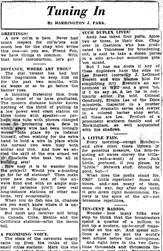


![]()
![]()
GREETINGS!
A new col'm is here. Never had much respect for col'm'ists and much less for the chap who writes this one—so you see, Friend Fan, we have things in common. With that brief introduction, let's go!
DISTANCE, WHERE ART THOU?
The dial twister has had but little inspiration to keep him on for the past two months, with six weeks or so to go before the barrier rises.
A thinning fraternity this, from which most of us have graduated. The modern distance hunter knows nothing of the thrill of pulling in a low power west coast station on three tubes with speaker—or perhaps, one tube with phones clamped close to protesting ears. Sets in which every wire had been lovingly woven 'into place by ye listener himself, often wishing for the extra hand to hold a wire in place while the normal two were busy with soldier and iron. And how we envied the skill of the one armed vet in Charlotte who beat 'em all in building sets!
How easy it is to wander from the subject ! Would you a-hunting go for far off stations? Then make your new radio one of the all-wave kind and with an ample supply of patience you'll hear long-distance stations of other nations, very occasionally.
When you do fish one in, chances are you won't know where it is unless you're a linguist.
But most any receiver will bring in Canada, Cuba, Mexico and the California stations—after the leaves fall.
A PROMISING VOICE.
The stars of the networks mostly came up from the ranks of the small cities stations. Mark this one down—if Alfred Garr of the vibrant tenor voice via WBT stays with the game, Al will go big time one day. A nice clean chap he, well liked by his comrades at the WBT studios and in the other paths he travels.
There are those on both networks now, featured as top-notchers, who have less to offer listeners than young Garr!
YOD-LERS TAKE THE RAP.
A lazy radio fan am I, slow to twist the dials or throw the switch. But there's action a-plenty to do either when the ether is blasted by the warning call of "Oh-lee-aylee" of the hill-billy yod-ler. Must we suffer on, ye powers of WBT? And have you no fear of those sixteen hundred dollar tubes in the new transmitter you've told us about? Anyway, when did our mountain friends add yodeling to their characteristic melodies? Stay true to type !
SUCH DUPLEX LIVES!
Andy has taken four parts, Amos two or three, in their duo. Chap over in Gastonia who has graduated to Tennessee for broadening out, is said to take a dozen parts in a solo act—but sometimes gets 'em mixed.
But I hae ma doots if any of these duplexers have the edge on Lee Everett (correctly J. LeGrand Everett and who blames him for simplifying it?) Everett's an announcer at WBT and a good 'un, if I do say so. Also he is continuity editor, I'm told. Colonel Goodbody, Efraim Lee of the Dixie minstrels, inspector in a murder mystery dramatic series and lawyer in a colored barber shop serial, all these are Lee. Product of a prominent southern family and of Rockingham, so well acquainted with his shadow.
A LITTLE PAIN.
Every morning—except Sunday—and a few other times thrown in for generous measure, the non-resisting air waves convey the trillations (wot-a-woid ) of one Jack Little, prefaced, if you please, by "Little." Network stuff. Should be good, but—!
What does the prefix stand for. CBS? Little repertoire? Same old tunes, and not many of them, same old way, day after day until it gets down right monotonous. Variety is the spice of the air—not boresome repetition.
TEN-CENT RADIOS.
Wonder how many folks ever stop to think that the broadcasters spend a quarter of a million to put up a modern, up-to-snuff transmitter on the air. And spend millions a year to put the world's best artists before the microphone.
And right here in the two Carolinas thousands and thousands listen to ten cent sets! Exaggeration? Not at all. Take your three or four-year-old pet distortioner out and peddle it, and mayhap you'll find it not even worth a dime.
Today's product of the radio engineer for the listener is the biggest dividend payer anyone can spend their shekels for. It's made to reproduce the quality that the broadcaster puts on the air. You can hear all the instruments in an 80-piece symphony; with your old adobination you're lucky if you hear half of them. It was a darned good set when it was made—but the march of progress in radio has been swift.
New sets tune sharp, too; stations do not run together. Automatic volume controls—wonderful, almost magical things—almost eliminate fading and do permit one to tune from station to station, receiving each with equal signal intensity. And they cost so little the wonder is that everybody doesn't own one. Why hug an old cripple that robs you of the finest in music? Just like sitting through a good musical show with one eye closed and one ear plugged!
Aufwiedersehn.